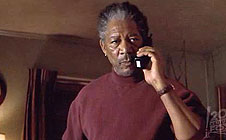|
|
|
|
High
Crimes
|
 |
|
Despite the long overdue honour accorded three highly visible African-American actors at the 2002 Academy Awards ceremony, there is still a long way to go before anything resembling racial equality characterises the American mainstream film industry. Take the ranks of African-American directors. Almost everyone has heard of Spike Lee (even if most of his films beyond 1995 have bypassed Australian screens), but too few know about the remarkable Charles Burnett (To Sleep with Anger [1990], Warming by the Devil's Fire [2003]). Carl Franklin is an actor-turned-director who maintains a middle position in the industry between Lee and Burnett. His official filmography cagily erases the fact that he cut his teeth making cheap quickies for schlockmeister Roger Corman before his breakthrough success, One False Move (1992). Since then, he has proved himself adept at both stylish, retro crime fiction (Devil in a Blue Dress, 1995) and sentimental, family melodrama (One True Thing, 1998). The very pleasing High Crimes brings the various strands of his work together. Everything is too good to be true for Claire (Ashley Judd) at the beginning of this story. She is a lawyer with a great job and a wonderful husband, Tom (Jim Caviezel). The couple eagerly look forward to starting a family. But tiny signs of unease are evident everywhere – until, one night, a small army descends on Tom, charging him with hideous crimes committed when he was a soldier stationed in El Salvador. Claire, of course, stands by her man and personally takes on the case – immediately coming up against the inscrutable institution of the American military. But, like the heroines of suspenseful 1940s romantic melodramas, Claire struggles with severe doubts concerning her hitherto ideal man, whose past identity has been kept a secret from her. (This plot anticipates elements of David Cronenberg's A History of Violence [2005].) High Crimes deftly mixes several kinds of movie genres – always leaping from one to another in order to create plot surprise and psychological intrigue. On the one hand, it is a proudly old-fashioned woman-in-peril tale, mixing a woman's highly intimate agonies with her need to master a complicated and threatening public world. Judd is among the few contemporary actors who can match the poise, skill and energy of classic stars like Bette Davis or Barbara Stanwyck, and here she shines. The film is also a cracking courtroom drama – bringing a long lost lustre to a genre tarnished by so many tepid John Grisham adaptations. Cinephiles will quickly recognise the many homages made by Franklin and writers Yuri Zeltser and Cary Bickley to a sterling model, Otto Preminger's masterpiece Anatomy of a Murder (1959). Not only is the guy on trial maddeningly ambiguous, but the lawyer's sidekick – here enjoyably incarnated by Morgan Freeman – is a once-brilliant attorney now struggling with the demon of booze. What really distinguishes High Crimes, however, is the toughness of its political theme. The story touches on many issues – American foreign policy, the corruption of the institutions of law and order, the extinguishing of the rights of individual citizens. Franklin's other major model is Michael Mann's The Insider (1999), with its justly paranoid vision of individuals stealthily menaced by The System. Franklin keeps everything moving along agreeably. There is an undeniable Hollywood slickness in his determination to give even the most minor characters – such as Claire's flighty sister, Jackie (Amanda Peet), and Embry (Adam Scott), the inexperienced military attorney assigned to the case – their own arc of crisis and redemption. But, in the final analysis, it is precisely the film's attention to such emotional detail that gives it texture and momentum. Like many mystery thrillers, High Crimes tends to dissolve away at the end, its many issues vanishing once the plot is tied up. But, as long as the ride lasts, this is an inventive and intricate movie, a modest gem of the sort too rarely seen in our blockbuster age. MORE Franklin: Out of Time © Adrian Martin May 2002 |
![]()